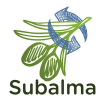OPTIDIGEST Operational Group: Optimization of digestate treatment for composting and evaluation of its influence on soil water retention
- Type Operational group
- Status In progress
- Execution 2023 -2026
- Assigned Budget 150.000,00 €
- Scope Autonómico
- Autonomous community Aragón
- Main source of financing CAP 2023-2027
The main objective of the project is to integrate digestate as a soil amendment and compost, as well as to evaluate soil quality using an innovative methodology, and to study the application of compost using spreading discs to improve fertilizer distribution and efficiency. The use of digestate for compost offers several innovations and benefits compared to other organic amendments or conventional fertilizers, such as waste recovery, balanced nutrient provision, improved soil structure, nutrient stabilization, and pollution reduction.
The results to be obtained are: the characterization of the digestate and compost obtained, and evaluation of their quality as a source of nutrients for the soil, recommendations for the treatment of digestate through composting and process optimization, an economic model for the treatment of digestate from composting, economic advantages of using the product generated in compost, and environmental advantages from the treatment and subsequent field application of the generated product.
The use of digestate for compost offers several innovations and benefits compared to other organic amendments or conventional fertilizers, such as waste valorization, balanced nutrient provision, improved soil structure, nutrient stabilization, and pollution reduction.
The results to be obtained are: the characterization of the digestate and compost obtained, and evaluation of their quality as a source of nutrients for the soil, recommendations for the treatment of digestate through composting and process optimization, an economic model for the treatment of digestate from composting, economic advantages of using the product generated in compost, and environmental advantages from the treatment and subsequent field application of the generated product.
The project's actions follow a strategy designed to achieve the stated objectives. The project structures its actions into four strategic Work Packages (WPs).
- PT1: whose objective is the evaluation of the digestate to be valorized, optimization of the composting process and demonstration of the process.
- PT2: The objective is to evaluate the compost produced, study and demonstrate field application, and monitor soil quality and modify water capacities.
- PT3: The objective is to exchange knowledge and promote the replication of the digestate valorization model in Aragon to improve agricultural practices, reduce pollution, and enhance soil quality in the face of climate change.
- PT4: whose objective is communication and dissemination, in order to call for actions
The composting process is proposed as a solution for valorizing a byproduct such as digestate, reducing nitrogen loss in leachate during field application (focal area 5D). Reducing nitrogen pollution is one of the most important objectives within the agricultural and livestock sector, since improper application of digestate and slurry in the field leads to nitrate contamination.
Therefore, secondly, within this project, field application will be monitored to evaluate the sustainability of the generated product and its performance as a carbon sink and water retention in the soil, increasing the amount of organic matter in the soil (focal area 5D). This project will contribute to the sustainable growth of the region's agricultural and livestock economy through environmental validation of digestate valorization.
The main objective of the project is to integrate digestate as a soil amendment and compost, as well as to evaluate soil quality using an innovative methodology, and to study the application of compost using spreading discs to improve fertilizer distribution and efficiency.
This project seeks to address two challenges: the management and treatment of digestate as a potential waste product in Aragon, contributing to the Circular Economy objectives, and, at the same time, helping mitigate the effects associated with climate change in the agricultural sector.
- Coordinator/entity name: CIRCE Technology Centre
- Postal address: Avenida Ranillas 3D 50018 Zaragoza (SPAIN)
- Coordinator/entity email: dmer@fcirce.es; jmarano@fcirce.es
976976859 / 639464145
Aragon has significant agricultural and livestock farming, which provides a large amount of organic waste that can be used for biogas production. The biomass energy production situation in Aragon is promising and constantly developing. Therefore, various initiatives have been implemented in Aragon to promote biogas production, including the construction of biogas plants and the promotion of cogeneration projects.
These actions aim to harness local resources, reduce dependence on fossil fuels, and contribute to the region's energy sustainability. The digestate generated as a byproduct of anaerobic digestion is high in nutrients and can be used as an organic fertilizer in agriculture.
- CIRCE Technology Centre
- RECICLAJES DEL BAJO CINCA, S.L. (sarara@reciclajesdelbajocinca.com)
- FERTEC AGRO S. L. (antonio@fertecagro.com | jose@fertecagro.com)
- UAGA (aelorriaga@uaga-aragon.com)
- CIRCE Technology Centre







